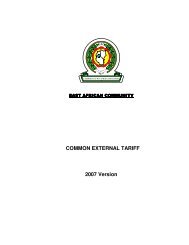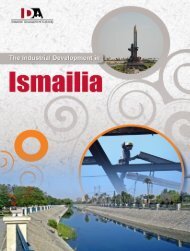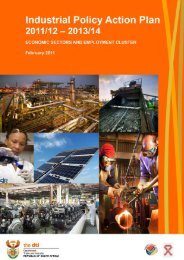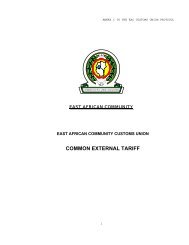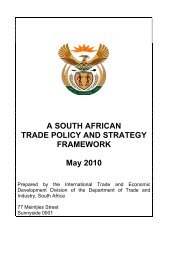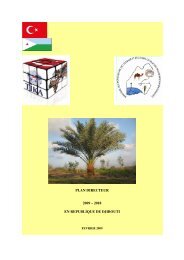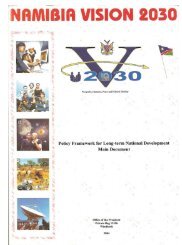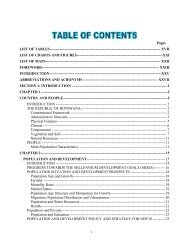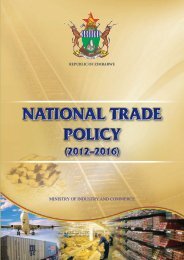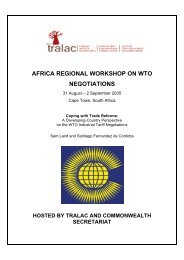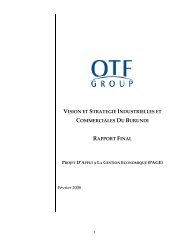rwanda national export strategy - minicom
rwanda national export strategy - minicom
rwanda national export strategy - minicom
Create successful ePaper yourself
Turn your PDF publications into a flip-book with our unique Google optimized e-Paper software.
RWANDA NATIONAL EXPORT STRATEGY<br />
administration does not offer incentives for businesses, especially SMEs, to pay taxes. Recent studies cite<br />
tax as a significant hindrance to operating in Rwanda. 31 Many of the rules are new, and few tax collectors<br />
have an adequate understanding of business to properly apply rules related to deductions and<br />
depreciation. As a consequence, numerous businesses and banks complain that tax liabilities are uncertain<br />
because it is difficult to predict what will be allowed or disallowed, which raises business risks.<br />
Issue #2 Rwanda should continue improving the regulatory environment directly affecting<br />
businesses. Rwanda has made significant progress in the World Bank‘s Doing Business Indicators,<br />
moving up 85 places from 143 rd in 2009 to 58 th place overall in 2011. The main areas for improvement<br />
according to the World Bank were closing a business (Rwanda ranked 183 rd out of 183 countries), trading<br />
across borders (Rwanda ranked 159 th ), and dealing with construction permits (Rwanda ranked 82 nd ). 32 Tax<br />
incentives for <strong>export</strong>ers and clear government procurement procedures would also help improve the<br />
business environment for <strong>export</strong>ers. In countries with better rankings, such as Georgia and Mauritius, flat<br />
taxes were recently introduced and had a positive impact on business development and the WB ratings.<br />
4.2.5 FINANCE & INVESTMENT<br />
While the Doing Business indicators show that Rwanda has made remarkable progress in terms of<br />
registering property, accessing credit, and protecting investors, there is still room for improvement in subareas<br />
such as the number of days to register property (55 in Rwanda vs. the OECD average of 25), ramp<br />
up the development of credit registries (which until recently existed in much of sub-Saharan Africa, but<br />
not Rwanda), and in shareholders‘ rights to sue officers and company directors for misconduct (Rwanda<br />
lags both Sub-Saharan Africa and the OECD). 33 This impacts the long-term investment and financing<br />
levels in the country, and will need to be addressed to unlock financing in Rwanda‘s private sector.<br />
Over two-thirds of businesses queried in the Private Sector Federation‘s 2008 Business Investment<br />
Climate Survey cite finance as a major challenge. 34 Lack of collateral is ranked as the biggest challenge,<br />
but as illustrated by figure 3 below, there are additional constraints.<br />
These constraints are particularly difficult to overcome for <strong>export</strong>ers as they seek new market access,<br />
relationships with foreign traders, and lines of credit to develop distribution. Rwanda is not the only<br />
developing country that needs to increase finance and investment, and it can follow other examples by<br />
adopting operational efficiencies used by <strong>export</strong>-leading countries (e.g. <strong>export</strong> insurance schemes and<br />
credit services for trade finance), to lower the cost of capital for its businesses.<br />
Notwithstanding the chart below, progress has been registered in several areas including:<br />
<br />
<br />
<br />
Use of formal financial services increased from 1.4 million citizens in 2007 to almost 2 million in<br />
2009.<br />
GoR reduced bank reserve requirements from 8% to 5%, and BNR‘s lending interest rate to<br />
commercial banks decreased from 9% to 7% in 2010.<br />
Private sector credit surged 40% in 2008 and held fairly steady in 2009 (with only a 2% decline).<br />
At a macroeconomic level, private direct investment increased from US$103 million in 2008 to US$119<br />
million in 2009, and approximately US$1 billion in FDI has been committed in the last decade.<br />
31 See PSF, GTZ (2008) Cutting the cost of red tape for business growth in Rwanda and PSF (2008) Business Investment Climate Survey (BICS)<br />
32 World Bank‘s Doing Business Indicator‘s website: http://www.doingbusiness.org<br />
33 World Bank Doing Business Indicators for Rwanda: http://www.doingbusiness.org/exploreeconomies/?economyid=160#GettingCredit<br />
34 PSF Business Investment Climate survey, July 2008, n=909: Qn. 8. How important are the following issues in constraining your access to<br />
finance?<br />
Page 22



